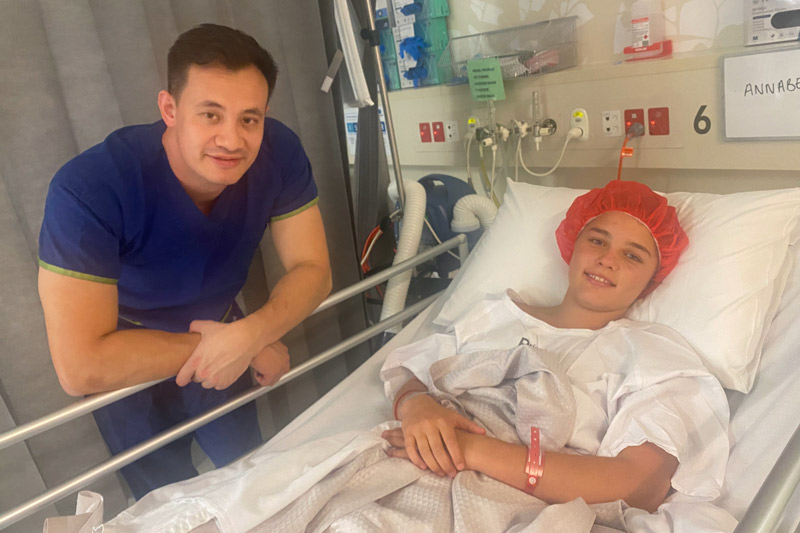“At the most direct level, research gives patients access to developing treatments that can have a profound impact on their symptoms and functioning,” Professor Paul Fitzgerald says.
Paul joined Epworth in February, as the inaugural professor director of psychiatry, in partnership with Monash University. Paul’s appointment has also launched Epworth’s mental health education and research unit, the Epworth Centre for Innovation in Mental Health.
“By far the most satisfying part of my role is seeing patients achieve dramatic and life-changing benefits when treated as part of innovative research protocols. On another level, research can provide critical hope to patients: the sense that something is in the pipeline for the future, especially for patients struggling with illness not responding to established treatments.
“My focus so far has been to get a number of research studies up and running as quickly as possible. I have been excited by the openness to research and new ideas at Epworth and the programs in place to facilitate this,” Paul says.
Paul, a world leader in transcranial magnetic stimulation (TMS), is working to establish a unique clinical research program, with involvement from patients at Epworth Clinic. The unit’s research will focus on some of the key conditions the clinic sees regularly, and will include exploring novel brain stimulation treatments for depression, obsessive compulsive disorder (OCD), post-traumatic stress disorder (PTSD) and dementia.
TMS is one such brain stimulation treatment currently used at Epworth Clinic, mostly to treat severe depression. There is now a highly promising range of other similar treatments in development.
“I’ve been doing research for about 20 years now, the majority focused on the technology end of the psychiatry spectrum,” Paul says. “Using technological tools to investigate and understand brain activity, but also developing and clinically testing a number of new forms of treatment using brain stimulation.”
Paul has run more than 15 clinical trials using TMS and related technologies in the treatment of depression, and more recently conditions like OCD, Alzheimer’s disease and PTSD.
“As that research has expanded to other disorders beyond depression, we have also developed studies using other brain stimulation techniques, including types of stimulation that prove to be a replacement for electroconvulsive therapy and other invasive forms of treatment for more severe patients,” Paul says.
Paul has two key trials commencing at Epworth this year: finding novel treatments for OCD, and personalising treatment for patients with depression.
“The first trial explores the use of TMS in patients with OCD. This is a disorder where there are large numbers of patients who don’t ever get treated. It is a relatively common condition — affecting one to two per cent of the population, and about half the patients with OCD don’t respond to standard treatments and remain chronically disabled. There’s a major unmet treatment need in that disorder,” Paul says.
He notes that there is a surprising lack of innovative treatments under development for OCD — with very few new drugs or other treatments being tested.
“I think that’s an area I have considerable passion for, because if we can develop TMS as a successful treatment in that patient group, it will have very substantial impact on people’s lives — in the same way that TMS has [had] for depression,” Paul says.
“We are also looking into improving the efficiency and efficacy of depression treatments, to reduce time spent in hospital. To help us achieve this, we want to integrate technologies into therapy that help us dynamically investigate brain activity in a way that can directly drive how treatment is administered, to hopefully take patient outcomes to a new level.
“One of the main things that technological development in psychiatry has facilitated is the capacity to think about how we can personalise treatments. A lot of current treatments are a one-size-fits-all approach — everyone gets the same dose of a drug, or the same type of psychotherapy or the same type of brain stimulation.
“We’re getting to the point now where we can use brain imaging, genetics and other ways of investigating brain function to begin determining the way people are treated. It’s an approach that naturally fits with brain stimulation, because we are often targeting very small areas so we can use brain imaging to increase the fidelity and accuracy. It’s also an approach that I think has got application across the board,” Paul says.
“We really want to be at the forefront — not only of developing those technologies — but of working with industry partners and other groups to bring personalised mental illness treatment to patients as quickly as we can.”
If you are interested in participating in mental health trials or would like more information, email: [email protected]
Photo: Professor Paul Fitzgerald (pictured fourth from left) members of the research team from the Epworth Centre for Innovation in Mental Health.




